Features
A Mead Hall In America
Big Big Train Makes Their Long-Awaited U.S. Debut
by Jason Warburg
It moves, it heals, it communicates and does all these incredible things.” – Tom Petty
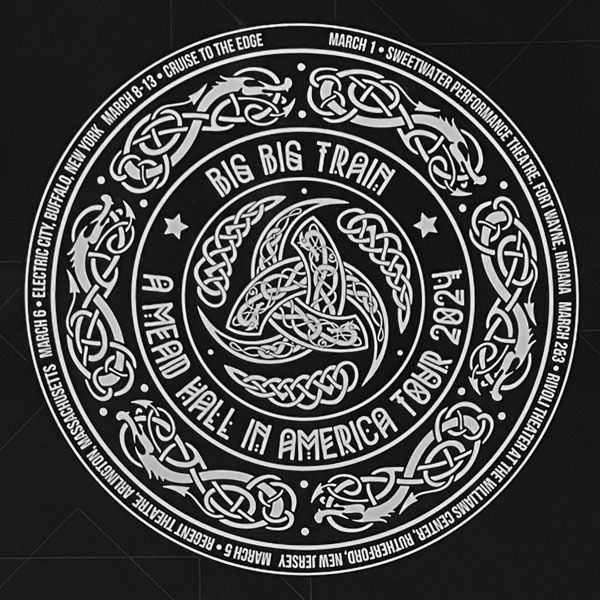 Earlier this month the British progressive rock collective Big Big Train played its first shows ever in America—the culmination, and celebration, of a tumultuous journey of more than three decades. It was a moment I felt privileged to witness, for reasons far beyond the quality of the music. Here is a saga full of highs and lows, triumph and calamity, wonky time signatures and supple melodies, all leading to a singular, unforgettable moment.
Earlier this month the British progressive rock collective Big Big Train played its first shows ever in America—the culmination, and celebration, of a tumultuous journey of more than three decades. It was a moment I felt privileged to witness, for reasons far beyond the quality of the music. Here is a saga full of highs and lows, triumph and calamity, wonky time signatures and supple melodies, all leading to a singular, unforgettable moment.Hope This Finds You
We begin at the beginning: in 2007 an envelope arrived on my desk postmarked Bournemouth, UK. Inside I found an album by an artist I’d never heard of, a British prog band by the unwieldy name of Big Big Train. As a teen I had fallen hard for the harmony-rich orchestral rock sound of ’70s Yes. In the years that followed I dabbled briefly in contemporaries such as Pink Floyd, Emerson, Lake & Palmer, and Genesis, but none ever came close to capturing my imagination the way that classic Yes had.
By the time the 21st century had rolled around, though, it had been decades since I’d followed the prog genre at all; it just fell out of my consciousness, as I never found another band—including the many latter-day versions of Yes—that could measure up to the unique combination of warmth, intensity, intelligence, melodic sophistication, instrumental virtuosity, and sheer exuberance found on albums like Fragile and Going For The One.
The album in the envelope that day in 2007 was The Difference Machine, presented inside a darkly intriguing cover that felt like it was winking sideways at Dark Side Of The Moon, while holding the promise of thoughtful artistry inside. “Five minutes,” I thought, deferring to standard practice for screening unsolicited submissions to The Daily Vault. “I’ll give it five minutes.”
An hour later I was still listening, well on my way to becoming a dedicated fan of a band that I’d never heard of just moments before, a process that was completed two years later with the arrival of the group’s 2009 album The Underfall Yard, a modern progressive rock masterpiece and one of my “20 Albums That Influenced Me.”
Common Ground
The founder and principal songwriter for Big Big Train (often abbreviated as BBT) is a fellow—a chap, if we’re being culturally appropriate—named Gregory Spawton. His songs demonstrate a deep love of history—not the dry stuff of textbooks, but the richly layered reality and innate human drama of actual historical events. The magic, though, is in the way he takes any given subject, strips it to its emotional core, and then renders it with a novelist’s eye for the telling detail, while wrapping his lyrics in exceptionally dynamic and harmony-and-melody-rich music.
Spawton has written prog epics of 12 to 25 minutes about topics as diverse as the laying of the first transatlantic telegraph cable, the end of the railroad era, the golden age of British auto racing, and the interstellar journey of the satellite Voyager. The band’s signature 15-minute epic “East Coast Racer” is the genuinely thrilling tale of a purpose-built steam engine and the crew that drove it to a land speed record in 1938. Adding both majesty and complexity, many BBT songs find the core band of seven players augmented by a brass ensemble of four or five.
All of which stands as evidence of both superb composition and a fertile imagination, but what draws me to Big Big Train’s music again and again is its humanity. Album after album, year after year, their songs celebrate connection, community, love and light—intellectual light, yes, but also empathy, compassion, kindness.
It’s a constant ethos that helps to explain the unique sense of community that has grown up around Big Big Train over the past 15 years.
The band’s presence on Facebook dates from the late 2000s, but really took off between The Underfall Yard (2009) and English Electric Part One (2012) as new fans flocked to its page and group. Today a forum that once numbered in the hundreds and was mostly moderated by Gregory Spawton and his wife Kathy requires half a dozen volunteer moderators to manage the steady flow of conversation among its more than 10,000 members, known as the Passengers.
A whole subculture of in-jokes has grown up within the forum (sprouts, anyone?), but the remarkable thing is the pride of citizenship demonstrated by most participants. Big Big Train’s Facebook forum is beyond a doubt the most polite, friendly, positive, welcoming place this internet addict has ever spent time online. It is a genuine community, one that has flourished equally in real life ever since the band’s return to live performance in 2015. The increasingly lengthy runs of shows up and down the UK and Western Europe over the ensuing years only strengthened this sense of connectedness, as the band established its habit—still in practice today—of venturing out into the lobby after every single show to mingle with its audience.
All of which helps to explain why I was moved to step out of my comfort zone in early 2012 and request an interview with Spawton. We completed that one, and another in 2016, and a third just a few weeks ago, each time reveling in the exchange of ideas and energy. In between and around these on-the-record conversations, Spawton—
No. I’m sorry, but I just can’t go on calling the man by his last name as if I’m some sort of neutral observer, it’s honestly weird verging on absurd, because:
Gregory and I have become friends. I don’t use that word lightly. But we’ve been chatting with some regularity for more than a decade now, discovering acres of common ground. Among other things, Gregory did me the honor of reading both of my first two Tim Green novels and providing a very kind blurb for Never Break the Chain. We’ve corresponded mostly about music and writing, but also about family and cats and our shared affection for Italy, all those gossamer filaments that, over time, paired with curiosity and a welcoming spirit, form human connection.
That connection has extended to expressions of sympathy in difficult moments for both of us and, in better times, a summer day in 2019 spent happily rambling through Winchester—the setting for multiple BBT songs—with Gregory and Kathy and my wife Karen. At the time, we were free to imagine that we might see our friends again soon, as the band was in the planning stages for their first-ever US tour, set for the following spring.
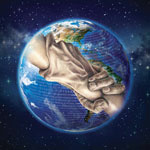 The Strangest Times
The Strangest Times
The following spring was, of course, the spring of 2020.
The pandemic not only wrecked BBT’s touring plans, it nearly wrecked the band itself. Over the course of that long lockdown summer, three of the seven core members decided that it was time for a reassessment, and long rides on tour busses did not figure into their new priorities. In the ensuing months, Gregory (bass, bass pedals) and the remaining trio of David Longdon (lead vocals and multiple instruments), Nick D’Virgilio (drums, vocals) and Rikard Sjöblom (guitars, keyboards, vocals) rebuilt the band, adding Dave Foster (guitars), Carly Bryant (keyboards, vocals), and Clare Lindley (violin, vocals).
This new lineup recorded two albums and worked hard to recapture the group’s momentum, planning toward a second attempt at touring in the US in 2022—and then an even greater catastrophe occurred. In November 2021, Gregory woke up to the news that his dear friend and BBT lead vocalist David Longdon had been critically injured in an accident. The next day he was gone.
Gregory has said that, in the immediate aftermath, it seemed impossible to contemplate the band carrying on. It was simply too much. But being who they were—intelligent, sensitive, ambitious, and also realistic—Spawton and Longdon had actually discussed what should happen to the band if one of them were to pass on. It was David’s firm wish that the band continue, that the music they had already made together live on. And so, after a period of mourning and celebration of Longdon’s life, Gregory and his bandmates agreed to continue.
How that might go was anyone’s guess at the time. While it’s true that Longdon had been the third lead vocalist in the group’s history, he was also a celebrated figure, the seemingly perfect frontman for the music they were making and a well-loved presence among the band’s followers. And in fact, the Passengers were working through their own shock and grief even as BBT and its band family were doing the same.
Light Left in the Day
In April 2022 Big Big Train announced Alberto Bravin of the Italian progressive rock band Premiata Forneria Marconi (PFM) as their new lead singer. The little bits of recorded music woven into the video announcement delivered a booster shot of hope: snippets of Bravin singing older Big Big Train songs showed great promise, along with glimpses of unheard new material that generated excitement about all that he could potentially bring to the band.
A trio of live shows in September 2022—two in the UK and one in the Netherlands—offered proof of concept: this was going to work. Besides giving Bravin his formal debut as frontman, these shows saw Oskar Holldorff of Norwegian prog trio Dim Gray stand in for the absent Bryant on keyboards and harmony vocals, a role he subsequently assumed as a full band member.
From this initial success, the once again revamped group moved through a year-long cycle of writing and recording that led to a second, longer run of shows across Western Europe in August and September 2023, and planning toward a goal that had eluded Big Big Train for decades: their debut as a live act in America.
Brew And Burgh
During those initial lockdown months back in 2020, one of the projects the band had managed to complete was a 10th anniversary reissue of The Underfall Yard, which featured one entirely new song: “Brew And Burgh,” a celebration of the community fostered by the band both within its own ranks and collectively with its close-knit fan base. The lyric features callbacks to numerous past songs alongside a simple, hopeful message:
Come and join us
And we'll drown any sorrows
Come to the mead hall
And we'll raise a glass or two
Stand together
And we'll show what we're made of
Tell our stories
And we'll sing our way back home
It's the same sense of community that in recent years helped save the band from falling into the abyss not once, but twice. Gregory has been frank about the fact that decisions about the band’s future could have gone either way both in summer 2020 and again 18 months later in winter 2021-22. “It was those friendships and companionships and family life that really have kept me going,” he says.
The Connection Plan
Meanwhile, across the pond, we fans in the States watched and waited, wondering if we might ever have the chance to experience Big Big Train in a live setting. There has never been any guarantee of this; touring is an expensive and inherently risky proposition for a standard four- or five-piece rock band. When you start talking about a core band of seven, plus a four-piece brass section, plus crew, with all the associated travel and lodging, and with every member but D’Virgilio requiring an expensive visa in order to work in the US, it’s a financially daunting undertaking.
With characteristic aplomb and cleverness, though, the band, together with manager Nick Shilton and tour manager Graham Collins, devised an approach that just might work. First, they lined up an anchor gig to help underwrite the smaller, chancier ones: Big Big Train signed on as one of the headliners for the 2024 Cruise to the Edge, a Miami-based cruise populated by 3,000 or so enthusiastic progheads and co-starring Steve Hackett, Marillion, the Flower Kings, and other luminaries of the genre.
Then the BBT team set about scheduling a small run of theater shows on the East Coast ahead of the cruise. Finances dictated no brass band for the theater shows—adding four more players was just too expensive—but the group devised a workaround by playing three-dimensional chess with its lineup. Guitarist Dave Foster—who also keeps busy with the Steve Rothery Band and solo work—agreed to sit out the initial US run, leaving room in the budget for the band to bring in a sideman—American multi-instrumentalist Cade Gotthardt—to play trumpet as well as occasional guitar and keyboards. Meanwhile, Sjöblom’s guitar work would also be supplemented at various points in the planned set by Bravin, Lindley and Spawton.
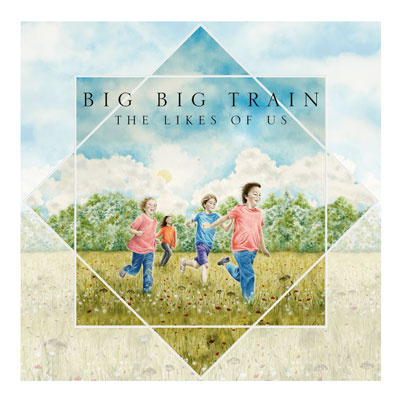 Skates On
Skates On
The powerful and deeply personal album that the new lineup had recorded in summer 2023—The Likes Of Us—came out the same day that BBT finally made their North American debut: March 1, 2024. Considering how long he’d been lobbying his band to come to America, it was only fitting that the first show was held in Nick D’Virgilio’s hometown and home studio: Sweetwater in Fort Wayne, Indiana. The facility’s 200-seat venue sold out in days. Meanwhile the next two shows, on March 2nd and 3rd, were set for the Williams Center’s 650-seat Rivoli Theater in Rutherford, New Jersey, hosted and promoted by NJ Proghouse, with the promise of significantly different sets each night.
When I heard about these shows—none of them within two thousand miles of my California home—I was torn (briefly). I’ve been to a ton of rock shows over the years, but have never in my life booked air travel for the express purpose of seeing a band play. Never… until now. The reasons why I made that leap were both complicated and very simple: I wanted to see a band I had grown to love, that might or might not ever play in the US again, and I wanted to be there for my friend as he achieved a long-held dream.
Loss has been such a presence in our lives in recent years, both individually and collectively. Over the past four years, Gregory lost his stepfather, his close friend, two planned tours, and quite nearly his band. Over a similar span of time I lost both of my parents, my father-in-law, and a job I had loved for more than a decade. And we were hardly alone in this; the entire world lost the better part of two years to the pandemic, parting with loved ones and livelihoods, dealing with isolation and dislocations and all manner of wrenching changes in our lives. The associated trauma’s after-effects continue to ripple through the present in ways I believe we are still only beginning to understand.
Many—perhaps most—creatives use their creative work as a way to process trauma. Gregory addressed the losses he was experiencing in part by writing about them. (As did I.) But writing is a solitary activity, and as Gregory has commented, family and friendships and community are often a vital part of the healing process as well.
And so it came to pass that I followed the advice ribboned through the songs on The Likes Of Us—carpe diem, don’t wait, get your skates on—and made my way to New Jersey for the band’s second and third shows ever on the North American continent.
Last Eleven
On the new album, Gregory writes of the “Last Eleven,” the awkward kids left over when all of the athletic ones have been chosen for teams. His reference was specifically to cricket, but it applies to any sport in any school setting—there are always the last ones picked, “Those left behind / The oversights / The extras / The make-up-the-numbers / The footnotes / In other stories…”
Most of us have felt that way at some point in our lives. For all the bluster I can manifest at the keyboard, I’m usually quiet to a fault in any unfamiliar social setting. The fan gathering at a local brewery before the March 2 show in Rutherford was no different, and yet I was welcomed immediately as one of the group, encouraged to soldier through a series of awkward but inevitably warm conversations with strangers until I eventually hit overwhelm and excused myself.
At the venue, a worn-but-gorgeous old movie theater adapted for live music, the merch table was mobbed—a good thing since neither New Jersey show sold out, though the first night (Saturday) appeared to come close. Opening act Dave Bainbridge (of Lifesigns) acquitted himself well even if I found myself distracted and antsy during his set. Finally, as I settled back into my seat for the main event, I glanced around at the crowd. Besides their vintage (predominantly my age or older) and gender (predominantly male, like most prog crowds), the common thread I observed in much of the audience was anticipation bordering on giddiness. We had all been waiting for this moment for a very long time, with no guarantee it would ever arrive. Most of us had missed out on the chance to see the Longdon-fronted BBT lineup that made classic albums like English Electric Part One and Two, Folklore and Grimspound—but for band and audience alike, our patience and perseverance was about to be rewarded.
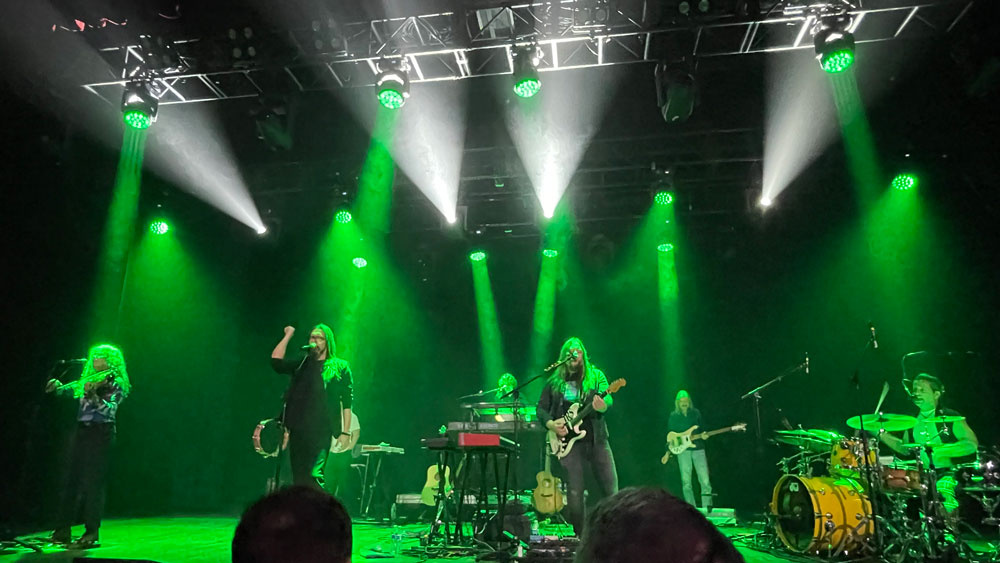 Folklore
Folklore
I’ve been to a lot of rock concerts—well into three figures, dating back to 1976. I’ve witnessed soundchecks, gone backstage, been part of the scene as a writer for decades now, which is to say, it takes a lot to surprise me at a rock show. What surprised me at this one was myself: specifically, the way my emotions ran away with me. The instant the house lights went down, before a single player had set foot on the stage, I felt my throat constrict and my eyes well.
Before the stage lights came up, before the band could even get to their instruments, a roar went up as the entire crowd shot to its feet, cheering and applauding like the team they had been following for years had just won the championship. Which, in some sense, it had.
And then the band was there, right in front of us, tearing into the anthemic opening number “Folklore,” the ecstatic crowd staying on its feet for the entire song in a sort of delirium of joy. Looking around, it was clear that several hundred people around me were all having the same reaction in the same real time: wonderment, delight, relief, fulfillment. A long-awaited dream finally made real.
The setlists for both nights were weighted with older tracks that most Americans had never had the chance to hear played live, a typically thoughtful choice. “Folklore” segued to “The Connection Plan,” a lively D’Virgilio number from 2022’s never-toured Welcome To The Planet, and then directly into musical nirvana: a sinuous, driving “The First Rebreather” followed by richly melodic “The Florentine” followed by ringing anthem “Summoned by Bells” followed by—good freaking lord—the tour’s theme song, the 15-minute twisting-turning instrumental and lyrical tour de force “A Mead Hall in Winter.”
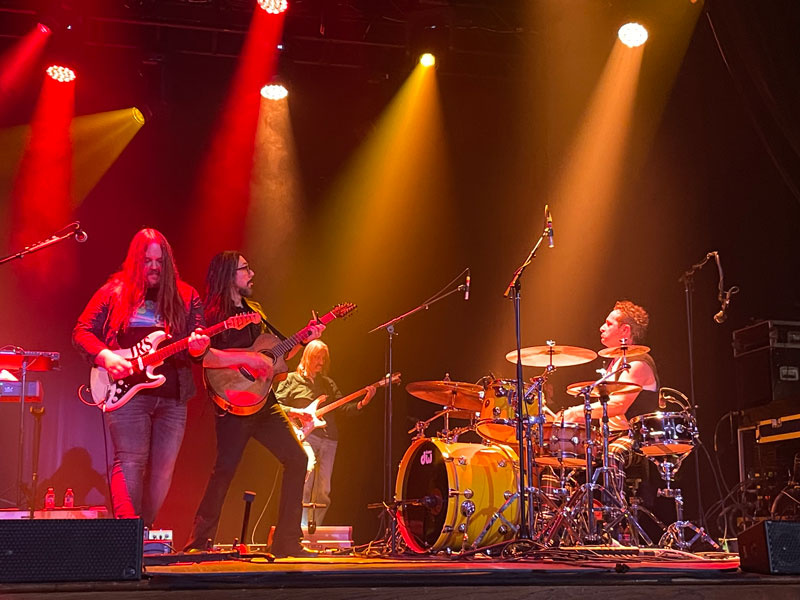 After the latter, a briefly winded D’Virgilio stated the obvious: “That’s a f---ing hard song to play!” Once the laughter faded, he and Sjöblom delivered a gorgeous duet version of Longdon’s “Telling The Bees,” before the full band returned for a superb reading of the soaring “East Coast Racer." Closing out the setlist, "A Boy In Darkness" riveted, “Love Is The Light” sparked a whole-crowd singalong, energetic instrumental “Apollo” set every foot in the theater tapping, and the band encored with a reach-back to The Underfall Yard for Gregory’s moving, dynamic “Victorian Brickwork.”
After the latter, a briefly winded D’Virgilio stated the obvious: “That’s a f---ing hard song to play!” Once the laughter faded, he and Sjöblom delivered a gorgeous duet version of Longdon’s “Telling The Bees,” before the full band returned for a superb reading of the soaring “East Coast Racer." Closing out the setlist, "A Boy In Darkness" riveted, “Love Is The Light” sparked a whole-crowd singalong, energetic instrumental “Apollo” set every foot in the theater tapping, and the band encored with a reach-back to The Underfall Yard for Gregory’s moving, dynamic “Victorian Brickwork.”
A Mead Hall in Winter
Night two in Rutherford featured a substantially different setlist—but my intention here wasn’t to deliver one concert review, let alone two.
In the end, it was a weekend-long series of peak moments highlighted by two evenings packed with songs I’ve loved for years played with tremendous heart and precision; a wonderful reunion with the East Coast friend who joined me for the second night; and a dozen feet-barely-touching-the-ground conversations with band members, fellow fans, and the delightful Kathy in the lobby afterwards.
Those moments remain mine to savor; the part I’m still in awe of more than a week later is the larger picture.
I can only speculate about the band members’ thoughts and emotions while they were on stage during these shows. There must have been times in the last two years when each of them second-guessed the decision to continue. They faced so many obstacles—emotional, practical, financial—but the joy they ultimately took in performing this music, for these fans, this community, was written on every one of their faces all night long for the two shows I was privileged to witness. Ovation after ovation told the story: yes, they endured unimaginable losses and trials to arrive at this moment, but this music, this art belongs in and to this world. Every time Big Big Train plays now, they both grow their own legend and extend the reach of their friend David Longdon’s musical legacy. It’s a magnificent way to help the whole community they have grown up around them—band and fans—to heal and forge onward, as one must.
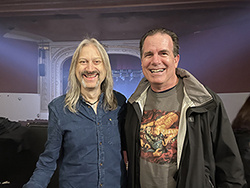 What this weekend said to me, again and again, is this: we may have lost a lot—but we still have this. We still have this music we love, and this community we’ve built. I’m one who believes profanity is best used sparingly, to preserve its impact, so it’s with all due consideration—and a nod to the irrepressible NDV—that I say that watching this band do what it was born to do, at a moment like this, for a crowd that couldn’t possibly have appreciated it more, was really fucking beautiful.
What this weekend said to me, again and again, is this: we may have lost a lot—but we still have this. We still have this music we love, and this community we’ve built. I’m one who believes profanity is best used sparingly, to preserve its impact, so it’s with all due consideration—and a nod to the irrepressible NDV—that I say that watching this band do what it was born to do, at a moment like this, for a crowd that couldn’t possibly have appreciated it more, was really fucking beautiful.
To Nick and Rikard and Clare and Alberto and Oskar and Cade and the entire BBT team: Bravo. You earned every ovation.
To Gregory: Congratulations, my friend. You did it.